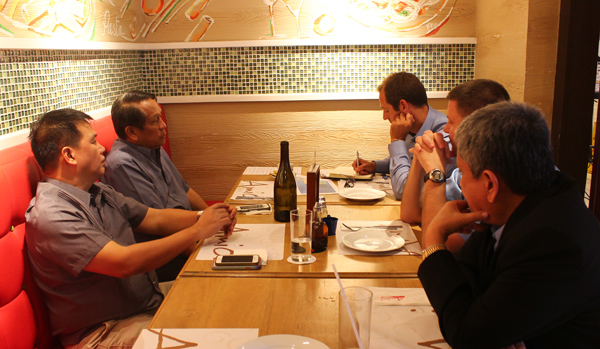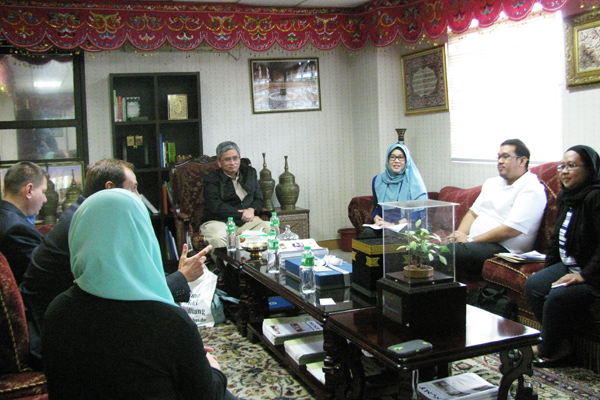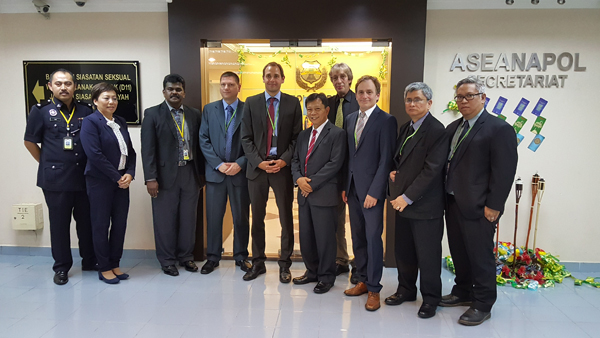HSF South and Southeast Asia Division Head Hanns Bühler meets with Project Partners in the Philippines

HSF
In the course of the visit to the Philippines, Mr. Bühler met with Retired Police Deputy Director General Ricardo De Leon, the President of the Philippine Public Safety College (PPSC). Dr. De Leon gave an update of steps taken by the PPSC to integrate the use of case-based practical training in the programs of instruction of police recruits and senior officers. In addition, he emphasized the need to strengthen police training activities so that police officers will continue to exhibit professionalism and adhere to the rule of law during police operations especially with the present administration’s efforts to address the country’s drug problems.
In his meeting with Commissioner Gwendolyn Pimentel-Gana of the Commission on Human Rights of the Philippines (CHRP), the latter expressed strong interest and support for the proposed project on “Promoting the United Nations Guiding Principles on Business and Human Rights” which seeks to craft the Philippine Action Plan on Business and Human Rights or the National Action Plan (NAP), after which it will be endorsed to the President for approval. This project is linked to the ongoing Community-based Dialogues on Human Rights project among the Armed Force of the Philippines, the Philippine National Police, Civil Society Organizations, and the CHRP which is being supported by HSF, as it will focus on economic, social and cultural rights.
Mr. Bühler then met with Former Senator Aquilino Q. Pimentel, Jr., President of the Pimentel Institute for Leadership and Governance (PILG). Former Senator Pimentel shared his views on how adopting a federal form of government can help the Philippines empower its local government units to take steps towards political, economic, social and cultural development of their own areas in a way that matches the resources and responds to the unique needs of each. He believes the adoption of the federal system will help promote peace and unity amongst the Filipino people while recognizing and respecting the ethnic, religious and cultural diversity of the people, especially in relation to the ethnic and religious tribes and communities. Mr. Bühler welcomed the opportunity to exchange points of view, experiences and insights on how Bavaria was able to take advantage of being a federal state to develop itself and is now “paying it back” by providing support for other federal states. Both agreed that a deeper, more comprehensive understanding of federalism and how the Philippines can benefit from such a transformation would be a good point for co-operation. Federalism is part of the legislative agenda of President Rodrigo R. Duterte, who expressed desire to see the Philippines a federal republic before the end of his term.

HSF
Towards the end of his visit, Mr. Bühler met with Commissioner Mohammad Al-Amin Julkipli and other officers of the National Commission on Muslim Filipinos (NCMF) on possible collaboration to further the provision of legal training for Muslim community leaders who are promoting and disseminating legal information or paralegal training for Muslim community leaders whose advice is often sought and respected by the local population as these relate to developing the legal framework for settlement of civil disputes among Muslims, legitimizing the status of Moro nationals for them to avail of government services, and providing assistance for Muslim nationals who were the subject of police operations. In response to NCMF’s concerns for the Muslim communities to engage with the police and discuss issues as these relate to Muslim nationals who may be the subject of police operations, the HSF offered to link the NCMF, where possible with the HSF’s programs with the PNP where dialogues or for a between the police and the community are conducted with the intent to provide the community a better understanding of policing operations as well as answer the community’s questions relative to existing police operational procedures.

HSF
Previously, Mr. Bühler headed a delegation of HSF officers and travelled to Kuala Lumpur, Malaysia and Bangkok, Thailand. The delegation visited and met with officers of the ASEANAPOL Secretariat based in Kuala Lumpur. During the meeting, the ASEANAPOL officers said some regional policing issues that the police agencies face include cybercrime, financial and identity fraud, human trafficking, narcotics, and terrorism. HSF offered to share its experience with partner police institutions in three ASEAN countries namely, Indonesia, the Philippines, and Thailand with the contribution of the Bavarian Police, and the conduct of the regional policing conference to discuss further directions in police training and issues relative to regional police cooperation and in crafting an effective response to transnational crime.
In Bangkok, the HSF delegation met with representatives of the Bureau of Foreign Affairs and Transnational Crime and attended a Roundtable Discussion with the Management of the Royal Thai Police, the Royal Police Cadet Academy and the Police Education Bureau to discuss the existing cooperation and future collaboration between the HSF and these agencies.
